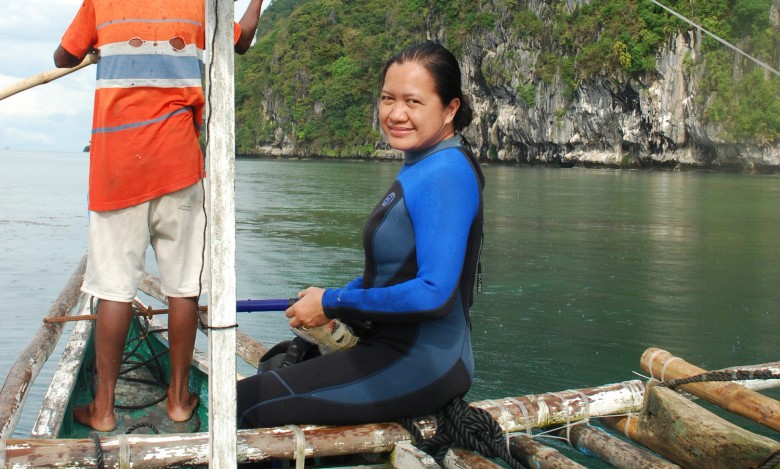
Maius Marcelo, Executive Director of the El Nido Foundation
Eye witness to a changing El Nido
September 18 2014
When Irma Rose “Maius” Marcelo was a small girl visiting El Nido to see family, she remembers entering the Población bay on her uncle’s boat as like gliding through an aquarium.
“You could see corals and fish through the clear water, right in front of the town,” says Maius, executive director of the El Nido Foundation.
“For the townspeople, it was like having a refrigerator in front of the house. They did not take out more than they could eat.”
Now it’s a different story.
“You can’t see live corals in the bay any more. Tourist boats, pollution, coral disease and bleaching, infestations of Crown of Thorns starfish and typhoons have all contributed to the damage,” says Maius.
“At the same time, the fish catch has dramatically reduced, and fishermen’s incomes too. Local people now have to go a lot further to fish. They are competing with international fishing trawlers - and the fisheries can’t keep up.”
The El Nido Foundation, which Maius joined in 1998 and now leads, will act as site coordinator for the CCRES project’s pilot site at El Nido in northern Palawan. The Foundation’s vision is improvement in the quality of life for the people of El Nido, while at the same time preserving the area’s natural resource base.
A partner in CCRES, the Foundation’s role is to work with the Country Coordinator (University of the Philippines’ Marine Science Institute) to ensure the project achieves its goals at the pilot site. They will represent CCRES locally, facilitate project activities, and support information exchange between CCRES, its local partners and other stakeholders. Communication and engagement, as well as local logistical support, are fundamental to their role.
The CCRES project is very timely, according to Maius, as the municipality is revising its comprehensive land and water use plan. The plan will guide future development in the area which is experiencing rapid change - with considerable impact on both the local people and the area’s natural resources.
“There’s a dynamism in El Nido. We have exponential growth in tourism, and the area is a target for immigration.”
Planning is critical to manage this change effectively, according to Maius.
“And we also need to think about climate change,” she says.
“Policy makers need more information to support their decisions.
“Another interesting challenge is how you attract the right investors so that sustainability, of both the natural resources and businesses, is assured.”
So, what does the future hold for El Nido?
“Well – there are a lot of ‘ifs and buts’, however we are a development organisation so of course we hope for a bright future,” says Maius.
The CCRES project aims to support that brighter future for El Nido and for other coastal communities across the East Asia-Pacific.



